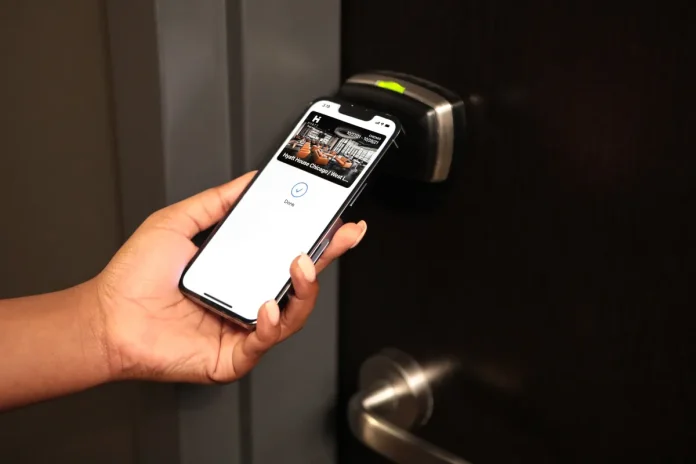In the face of hotel chains rushing to replace plastic room keys with digital options, Apple and Google wallets apps offer hotels the ability to store guests’ room keys in their wallets, according to CNBC.
Plastic hotel keys have had a rough few years. During the Pandemic, touch was taboo, so contactless trends accelerated. The problem regarding cybersecurity has become more pressing. Researchers this year discovered a vulnerability in plastic hotel keys that leaves up to three million keys open to hackers, a risk that could take years to fix.
Google Wallet and Apple Wallet are stepping in, offering hotels the ability to store guest room keys in their wallets, allowing them to access their rooms simply by putting the back of their phone against a reader near the door handle.
The popularity already has its roots. Hilton Hotels, for example, has an Honors app that allows guests to check in and use their room key via their smartphone. The 119-room hotel in the US state of Tennessee is a property of Hilton, and guests can check in digitally and store keys in their Google or Apple Wallet apps. Kimberly Elder, director of sales at the Harpeth Hotel, said that “the benefit to the digital check-in is that your phone is the key,” but many guests still prefer plastic key cards, according to her.
Some security experts warn that even the new blockchain methods are not completely foolproof because no system operates completely securely and that people should not let digital entry give them a false sense of security, according to Mehmet Erdem, professor, and chair of the department of resort, gaming, and golf management at the University of Las Vegas’s William F. Harrah College of Hospitality.
Erdem said plastic keys should not discount plastic keys just yet. There are magnetic keys, which require reading, and the new radio frequency identification (RFID) cards, which simply involve proximity or can go into a phone. RFID technology is improving, making plastic keys more versatile.
Lee Clark, cyber threat analytics production manager at the Retail and Hospitality Information Sharing and Analysis Centre (RH-ISAC), said:
Keyless systems can introduce entirely new threat vectors for hotel security operations to manage. Transitioning to digital and keyless lock systems carries a significant cost in equipment, installation, maintenance, and security.
Another challenge is human habits, which also contribute to the difficulty of transitioning to digital keys. For example, data from JD Power’s hotel survey showed that only 14 per cent of branded hotel guests used digital keys during their stay. The study says that people who downloaded the brand’s app on their phones still used a plastic key card.
JD Power reports that among guests who have the hotel company/brand app installed, 30 per cent use a digital key most of the time and 70 per cent use a plastic card. On the other hand, even many hotels simply don’t have locks with digital access capability.
Chad Spensky, CEO of Allthenticate, a company that develops smartphone access and credential management capabilities, compares the plastic key card to passwords, which cybersecurity experts consider non-tech and outdated. He stated that if one has to choose between a plastic card and a phone, the second option wins out. However, one of the biggest problems with key cards lies in the fact that once a vulnerability is discovered, there is no easy way to fix it.
We all still use passwords, despite the glaring security holes and clunky user experience. In the same way, key cards are likely here to stay. While the card implementations are no more secure than their plastic counterparts, their user experience is far superior.
